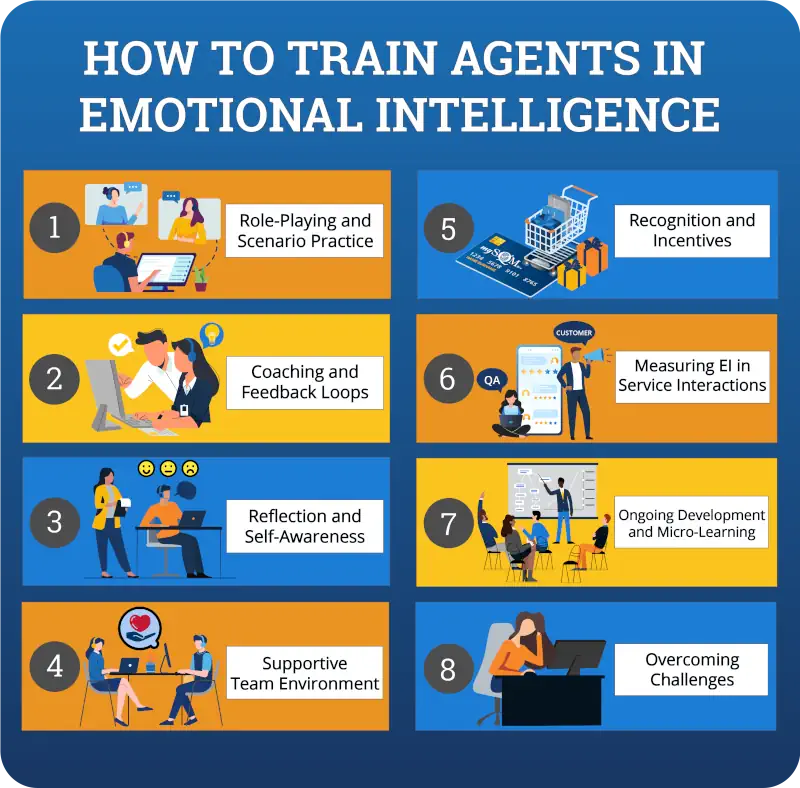Customer service is no longer just about solving problems—it is about shaping experiences that make customers feel valued. A customer may have their issue resolved quickly, but if they leave feeling ignored or dismissed, the interaction is a failure. Emotional intelligence (EI) helps close this gap by equipping agents to recognize, understand, and manage emotions effectively.
At SQM Group, we know that customer experience success depends on more than speed and accuracy. Customers want to feel respected and supported during every interaction, even when the solution takes time. Agents who demonstrate emotional intelligence build trust and leave lasting impressions that strengthen loyalty.
In this blog, we will explore what emotional intelligence is, why it matters in customer service, and how organizations can train agents to develop these critical skills. By combining practical training strategies with leadership support, companies can empower agents to handle difficult conversations with empathy and confidence.

What is Emotional Intelligence?
Emotional intelligence is the ability to recognize, regulate, and respond to emotions in yourself and others. While technical knowledge is necessary for solving problems, EI ensures those solutions are delivered with understanding and care. The core parts of EI include self-awareness, self-regulation, empathy, motivation, and social skills.
Self-awareness helps agents notice their own triggers, while self-regulation helps them stay calm when a customer is upset. Empathy allows them to step into the customer’s shoes and show understanding. Motivation keeps them focused on creating a good outcome, even during long shifts. Social skills bring it all together by guiding clear and respectful conversations with customers.

With intentional practice, coaching, and reflection, agents can build the abilities needed to handle difficult conversations more effectively. Organizations that prioritize EI development often see improvements in customer satisfaction, First Call Resolution (FCR), and employee well-being.
What Does Emotional Intelligence Mean in Customer Service?
In customer service, emotional intelligence is the bridge between problem-solving and creating a positive customer experience. Agents with high EI can recognize when a customer is upset, validate their concerns, and respond in a way that creates trust. This ability transforms potentially negative encounters into opportunities for connection and loyalty.
When customers feel genuinely heard and respected, they are more forgiving of delays or mistakes. A service interaction handled with empathy often leaves a stronger impression than one that is technically correct but emotionally cold. In many cases, how customers feel during the interaction becomes just as important as whether their issue was resolved.
Think about a customer who on hold for 20 minutes before reaching an agent. If the agent jumps straight into troubleshooting without acknowledging the wait, the customer may remain frustrated. But if the agent says, “I understand waiting that long can be frustrating, I appreciate your patience,” the tension eases. That display of emotional intelligence sets the stage for a smoother, more successful call.
Emotional intelligence also benefits employees by reducing stress and boosting job satisfaction. Agents who learn how to manage their own emotions are better prepared to handle back-to-back calls without burning out. As a result, call centers that emphasize EI not only improve customer satisfaction but also foster a healthier and more supportive workplace.
How Do You Train Agents in Emotional Intelligence?
Training agents in EI requires more than a one-time session. Agents need structured opportunities to practice, feedback to guide their growth, and leadership support to reinforce these behaviors. It is not enough to tell agents to “be empathetic”—they need practical tools and consistent support. Below are 8 proven steps organizations can use to build emotional intelligence within their customer service teams.


1. Role-Playing and Scenario Practice
Role-playing exercises allow agents to practice handling emotional situations in a safe work environment. Scenarios can range from dealing with an angry customer to assisting someone who feels anxious or confused. Trainers can pause the exercise, give feedback, and allow the agent to test different approaches.
These activities are especially helpful in call centers because agents deal with a wide variety of customers every day. A new hire might practice calming a frustrated caller, while a more experienced agent could work through a scenario that requires patience and active listening. By simulating different types of calls, teams build confidence and learn how to apply emotional intelligence in real situations.

2. Coaching and Feedback Loops
Coaching ensures EI training translates into real conversations. Supervisors should review calls not only for efficiency but also for how agents recognize and respond to emotions. SQM research shows that call centers emphasizing empathy achieve higher First Call Resolution (FCR) and customer satisfaction scores (CSAT), proving that EI directly impacts business performance.
Regular coaching also shows agents that their managers value emotional intelligence, not just call speed. When leaders provide feedback on both technical and emotional skills, it encourages agents to keep improving. Over time, this approach builds a stronger connection between agents and supervisors, while also improving customer experience.

3. Reflection and Self-Awareness
Encouraging reflection helps agents strengthen self-awareness. Quick post-call notes or emotional check-ins give agents space to recognize their own feelings before moving to the next customer. This prevents negative emotions from being carried over into new interactions.
Teams can make reflection simple by adding short debriefs at the end of shifts or encouraging peer discussions about difficult calls. These habits give agents time to process their experiences and prepare for the next interaction. In the long run, reflection helps reduce stress and creates more confident, self-aware employees.

4. Supportive Team Environment and Leading by Example
Creating a supportive team environment ensures EI training lasts beyond the classroom. When leaders demonstrate empathy in their own interactions, it sets the tone for the entire team. Recognizing examples of emotionally intelligent service reinforces the importance of these behaviors.
A strong team culture also makes it easier for agents to support one another. For example, teammates who check in on each other after a tough call create a workplace where agents feel valued and understood. Over time, this support system makes it easier for emotional intelligence to become a natural part of daily service.

5. Recognition and Incentives
Recognition reinforces the importance of EI. Agents should be acknowledged not just for hitting performance targets but also for showing empathy and patience. Celebrating emotionally intelligent service motivates others on the team to follow the same path.
Incentives don’t always have to be large or costly. Something as simple as highlighting an “interaction of the week” during a team meeting or offering a small reward can go a long way. These actions show agents that emotional intelligence is not only noticed but also valued at the organizational level.

6. Measuring EI in Service Interactions
Emotional intelligence can and should be measured. QA reviews can include criteria like tone, acknowledgment of customer feelings, and active listening. Combining these reviews with customer survey feedback paints a clear picture of how EI affects satisfaction.
Call centers can make EI measurement part of their regular scorecards to ensure it gets the same attention as technical metrics. When agents see that empathy and listening skills are evaluated, they understand that these qualities are just as important as efficiency. This approach makes emotional intelligence a real priority instead of an overlooked skill.

7. Ongoing Development and Micro-Learning
EI training works best when it is continuous, and micro-learning modules—such as short videos, quick scenario drills, or refresher tips—fit easily into busy schedules. These small, frequent touchpoints help agents reinforce emotional intelligence without feeling overwhelmed. They also make it easier to build training into daily routines, so learning becomes part of the workflow rather than a separate task.
This method also works well for large call center teams with high turnover. Short training refreshers can quickly bring new agents up to speed, while experienced staff can use them to stay sharp. Making EI training part of everyday customer service training ensures that emotional intelligence is always top of mind for the team.

8. Overcoming Challenges
Teaching emotional intelligence isn’t always easy. One challenge is avoiding “robotic empathy,” where agents use canned phrases that sound fake instead of truly listening. Another is burnout, which can happen when agents deal with upset customers all day without enough support.
Organizations can overcome these hurdles by offering wellness resources, stress-relief tools, and building space for agents to recharge. Encouraging authenticity is also key—when agents are reminded that it’s okay to sound human instead of scripted, they connect better with customers and feel more comfortable on calls.
Emotional Intelligence in Action: Strengthening Every Customer Connection
When agents apply emotional intelligence consistently, every interaction becomes an opportunity to deepen customer trust and loyalty. Training agents to recognize and regulate emotions creates stronger connections with customers and builds confidence within the team. Through role-playing, coaching, reflection, and recognition, EI becomes a consistent part of how agents deliver customer support.
By treating emotional intelligence as a skill that can be learned, companies turn every interaction into an opportunity for trust and connection. This approach improves business results while making the job more manageable for agents. The end result is service that not only solves problems but also leaves customers feeling respected and valued.
